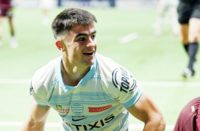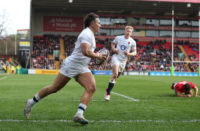 Fred Michalak is France's main man going into this Six Nations, with all the signs pointing towards flaky Fred having been transformed into formidable Fred. If his ascent as the golden boy of French rugby was breathtakingly rapid when he won his first cap at 19 against South Africa 11 years ago, the fulfilment of that precocious talent has been a long time coming. In fact, it could be argued that it was realised only this autumn, when Michalak pulled the fly-half strings so smartly that the Australians were sent packing, with the Argentines and Samoans following in their wake.
Fred Michalak is France's main man going into this Six Nations, with all the signs pointing towards flaky Fred having been transformed into formidable Fred. If his ascent as the golden boy of French rugby was breathtakingly rapid when he won his first cap at 19 against South Africa 11 years ago, the fulfilment of that precocious talent has been a long time coming. In fact, it could be argued that it was realised only this autumn, when Michalak pulled the fly-half strings so smartly that the Australians were sent packing, with the Argentines and Samoans following in their wake.
In an inspired selectorial move Philippe Saint-Andre recalled Michalak, who had just returned from a second Super 15 stint with the Sharks to join Toulon. The France coach was rewarded with a No.10 who was rounded and grounded, rather than the earlier version that was obsessed with producing the mercurial – the miracle pass, kick or moment that wins matches, but, when forced, can just as easily lose them.
This assessment from Saint-Andre's backs coach, Patrice Lagisquet, summed up their satisfaction with the new model Michalak. “He's very calm and patient. He knows what he's doing, and his game management surprised me a bit. He's reached maturity while keeping his creative talent. He kept mixing the team's options in November. Over the last 12 months he became a true fly-half. He became a leader on the pitch and also in the dressing room too. His experience in South Africa served him well. He can now make the most of any situations he finds himself in.”
Before the autumn, the road taken by the present day Toulon hero and former Toulouse superstar was rocky, and sometimes painful. Fred's eye for the gap and line-breaking acceleration were never in doubt, but his temperament sometimes was, both in terms of his decision-making on the pitch, and in coping with the media barrage that accompanied being French rugby's pin-up boy.
He had the added burden of being saddled with the quirky belief among senior French coaches like the Toulouse guru, Guy Noves, that the scrum-half and fly-half should be interchangeable, and therefore required a skill set that covered both positions. The main aim of this was so that when one of the half-backs was buried under a pile of bodies the other could slot seemlessly into their partner's position. The downside was that players like Michalak, and his Toulouse rival Jean-Baptiste Elissalde, became jack-of-all-trade half-backs who struggled for the expertise and knife-edge tactical nous gleaned from being a master of one of the two pivotal positions in the game.
Michalak was also not blessed with having an old head on young shoulders. A moment that captured his growing pains best was when he took liberties with Fabien Pelous, the big square-jawed lock who was the captain of France and Toulouse during much of Michalak's career. Pelous also doubled as the ‘Papa' – or enforcer – of both teams.
It started when Michalak and Clement Poitrenaud, his childhood friend, overstepped their boundaries as newcomers to the France squad by throwing pieces of bread at Pelous during a lunch break. When they ignored his suggestion that they stop, it finished with the ‘Papa' burying a fork in Michalak's hand.
He recalls: “It is a true story. We were being childish. I can laugh now, but it hurt. The fork just stayed there stuck in my hand.”

Michalak's ups and downs are reflected in long absences from the French team after being a regular fixture in the Bernard Laporte era. He was at the hub of Laporte's 2003 and 2007 World Cup campaigns almost exclusively at fly-half – and upstaged in both by Jonny Wilkinson, who now plays outside him at Toulon, for whom he usually wears the No.9 shirt – before falling out of favour when Marc Lievremont took over as coach.
He was out of the reckoning for France for almost a year and a half after the 2007 World Cup when he headed for South Africa and his first Super contract with the Durban-based Sharks. He eventually made a comeback in the 2009 Six Nations as a replacement scrum-half. However, he was surplus to requirements for a year after that, with loss of form and injuries keeping him out of the starting line-up until he reappeared in France's 2010 Grand Slam campaign as a replacement, at scrum-half, centre and fly-half, in the wins over Scotland, Ireland and Wales.
Michalak then spent another 18 months out of the French team, including not making Lievremont's cut for the 2011 World Cup, before being rehabilitated by Saint-Andre on last summer's tour to Argentina. In the interim he rejoined the Sharks, where he had met his South African-Australian wife, Cindy, and also parted ways with Toulouse, the club he had been with man and boy.
It cannot have been an easy separation, because his connection with the club runs deep. Michalak came from a poor background in the industrial sector of the city, and was one of four children from a broken home. He lived with his father, a bricklayer, and was left very much to his own devices until he got the rugby bug, and his dream to play for the city's champion club gave him a goal.
His old mentor, Noves, said that the two-time Heineken Cup winner simply took too long to agree to a new contract. “We set out our plans to Fred, and he took a very long time to make a decision. I said I saw him playing at 9 next season and he didn't know how to answer me. I gave him a month and a half to reflect on it. After five weeks, he had not thought about it.”
Noves added at the time: “We are in professional rugby. We have to move forward, to move quickly. The time passed and….we have signed two Southern Hemisphere players (Luke McAlister and Luke Burgess). We like Fred. I gave him his chance at 18, I am very attached to him. If he chooses other climes, we will try to help him leave on the best terms.”
However, cutting the chord appears to have had big benefits for Michalak, and for Toulon, who are the Top 14 leaders and have a home Heineken Cup quarter-final against Leicester. There was also the autumn series bonus for France, and it is an interesting footnote that despite the long periods he has been out of the team, Michalak has been on the winning side in 42 of his 59 tests for France (72 per cent).

Now, at the age 30, as he considers his career, new and old, Michalak's comments in recent interviews with Midi Olympique reflect a hard-earned maturity.
“I'm just older than I was ten years ago. There are certain positions on a rugby field like mine where you need years of experience – and like wine, I'm getting better as years go by. But I'm not thinking about it. It comes naturally without noticing it.”
“I don't think I'm a new man. I'm playing in winning teams, so it's easy to build on momentum and confidence, and you can see it on the pitch. Playing for Toulon helps a lot. It's a very ambitious club with a lot of international players. Even the staff are very ambitious. I'm surfing on the wave of success right now, and it's great for a player to keep on winning.”
One change he admits to is taking training more seriously, and it showed in his 91 per cent goal-kicking success rate in November. “I work a lot harder and longer now. When I was younger, I didn't work hard at training because I didn't believe it helped me that much on the pitch. But today I even enjoy the routine.”
There is also a clear statement that having been a guinea-pig for the French coaching experiment of swapable scrum-halves and fly-halves for over a decade, the time he has spent yo-yoing between the two positions has made him comfortable at playing 10 for France and 9 for Toulon.
“The switch is not that hard. It was the same ten years ago when I was at Toulouse at the start of my career. I think you need to be able to play in different positions in today's rugby. When I see Census Johnston deliver a try-scoring chip kick, I'm thinking he's on song with his timing. I now have the experience to switch from scrum-half to fly-half without thinking about it.”
Michalak says that one of the other benefits of experience is that he is not just better prepared, but more relaxed thanks to his spell in South Africa. “Since I arrived back in France, I've picked up where I left off with the Sharks….the Durban adventure helped me to rest and find some good times again. We did very well in the Super Rugby. It gives me a state of mind, and I'm trying to carry that same spirit to Toulon.
He adds that he also feels better able to handle the “Michalakmania” that has surfaced again since his rebirth for France.
“I'm leaving the fame to others now. I also know that it can change very quickly. Everything is great today, but, if I don't perform well, the media will be there to remind me about it. That's what professional sport is about. You need to stay at the top for a long time. Where I've changed is that I accepted I can't be at my best all the time. The season is far too long to be able to, so I try to manage it as best as I can.”
Michalak's confidence extends to the French side that start their Six Nations campaign against Italy in Rome today. “We're not trying to revolutionise rugby. We're trying to get the simple things right. Saint-Andre is very strict on defence and set piece. We built our succes in November on the back of these two vital aspects of the game, and that's where our success in the Six Nations will come from.
“We've been winning recently, and it's a lot easier to work when you win games. We have three games away this year so it'll be a hard tournament for us. What's great with Les Bleus is that we're trying to build something.”
Given the tournament-deciding potential of France's arrival on English turf three weeks from now, the Twickenham crowd is unlikely to break into a chorus of “Right Said Fred” to celebrate Michalak's new beginnings. Instead, they will be hoping with bated breath that, for the 80 minutes against Chris Robshaw's side, the great enigma of French rugby misplaces the answers that have been falling into place.
2 Comments
Leave a Comment
You must be logged in to post a comment.



























Ha ha ha. This article has not aged like a fine wine! Fred the flake bienvenue encore!
Pingback: white berry runtz